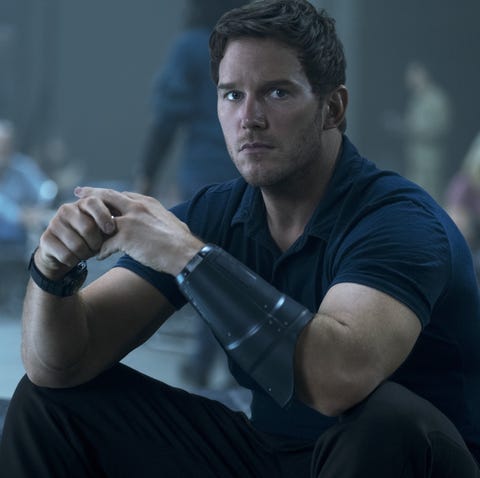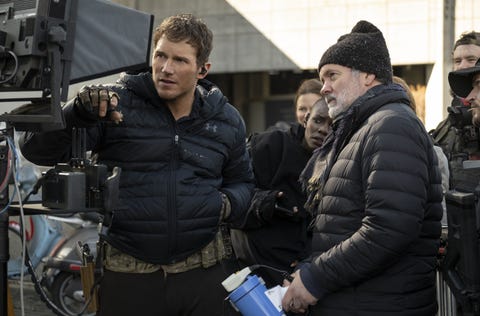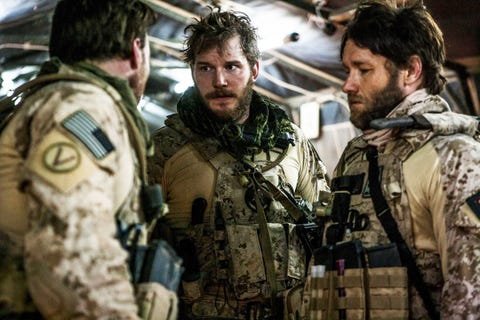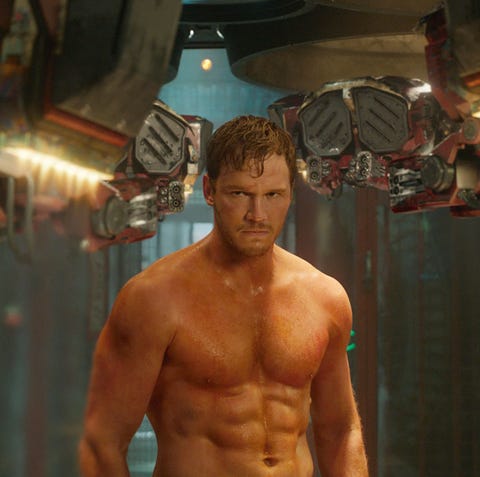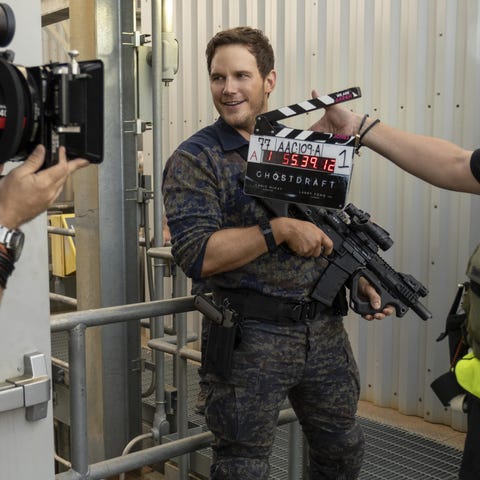The line is uncool, Chris Pratt thought. Awkward and stiff and uncool. The line is “I’ll be back”—except not as a contraction and with emphasis on the “will,” as in “I will be back,” not “I will be back,” or “I’ll be back,” which both definitely sound a lot cooler. Pratt delivers the line nearly thirty minutes into his new film, but it comes in the first thirty seconds of the trailer, which meant in early June, when Pratt sat down to show his father-in-law the clip, he had a problem: he was about to look very uncool. “Alright, Arnold,” Pratt prefaced. “I do say ‘I will be back,’ and it sucks … But! The trailer is pretty good?” Thankfully, pops agreed.
“He was very positive,” Pratt beams now, a few weeks later. “It wasn’t awkward. It was awesome.” Awesome, because Arnold Schwarzenegger had approved.
Pratt married into House Schwarzenegger in 2019, when he tied the knot with Katherine, Arnold’s eldest. Last August, the couple welcomed their first child, which means the Pratt bloodline and the Schwarzenegger bloodline (which, in this case, is also the Kennedy bloodline) have become one.
It’s hard to think of more different Action Star journeys than those of Pratt and his father-in-law. Arnold was plucked off the Mr. Olympia stage, his body the Platonic ideal of Man. Pratt—not so much. While it’s become somewhat trite and churlish to talk about Pratt’s weight—how he was a normal guy and then a portly guy and then a larger version of a normal guy and then a fricken’ Marvel hero—the weight did matter. It defined Pratt’s leading man career. It also forged a new kind of Action Star.
“I was playing the schlubby guy who’s falling down on rollerblades,” Pratt says of Andy Dwyer, whom he played on Parks and Recreation for 7 seasons. Pratt’s weight gain for Andy accumulated as a welcome decision and one that seemed to jive with Pratt’s engorging life at that time. He called the Andy archetype the “super-confident dumb fat guy.” He seemed to love it. But the role was all performance, and Pratt didn’t actually feel super confident. He’d been rejected from J.J Abrams’s Star Trek reboot and James Cameron’s Avatar. On the latter, Pratt was told he lacked “that thing,” the “It factor.” He left the audition room believing he would never have that thing.
The naked Hollywood truth: that thing, that “It,” was aesthetic. Pratt didn’t fit the mold. (Because of this feedback, Pratt initially passed on the chance to try out for Marvel’s Peter Quill, thinking himself too fat to play a superhero.) Then something changed during Moneyball. It was a role for which Pratt was told explicitly that he was too fat to play Oakland A’s former first-baseman Scott Hatteberg. Pratt decided to go for it anyway. He cut weight for the role and then gained muscle for his next, a Navy SEAL in Zero Dark Thirty. Seeing himself as a SEAL changed Pratt. “I saw myself in Zero Dark Thirty, and I was like, ‘I [am] believable,’” Pratt remembers.
But when it came time to fully enter the action genre, Pratt didn’t want to go in all muscle and no smiles. “[I wanted to] be a guy who’s believably the physical archetype of a hero,” Pratt explains, “but find a way to thread some comedy into there.” Pratt began to form what would become his particular version of the Leading Action Guy—one brought to final form in Guardians of the Galaxy. If Arnold’s 80s action star was the Super Confident Tough Guy, Pratt was forging someone a bit more approachable, closer to himself—big and confident, but in a more awkward and vulnerable way, like a boy who rubs a magic lamp and asks the summoned genie for a jawline—call him the Super Enhanced Every Guy. It’s become Pratt’s brand.
So far, that brand has more than proven itself with the Guardians and Jurassic World franchises amassing literal billions and making Pratt—now with full “It factor”—one of the most bankable blockbuster stars around. This month, Pratt will do something with this archetype he hasn’t done before: apply the Super Enhanced Every Guy to a brand-new property. The Tomorrow War, streaming on Amazon Prime Video, is both Pratt’s biggest onscreen role since Avengers: Endgame—a franchise by now guaranteed galactic success—and his first original concept action movie in some time. The big test now: Will fans go for it? Will Pratt’s action hero endure?
Men’s Health sat down with Pratt in early June to talk about this challenge and the action genre he’s been helping reinvent since he first danced across Morag to “Come and Get Your Love.”
MH: Happy early birthday! I imagine it’s easier to celebrate a spring 2021 birthday than a spring 2020 birthday?
CP: Yes, man! You’re right about that. Last birthday I was isolated in quarantine in London away from home, away from family in the middle of a pandemic on hold, waiting to go to work. And this time around, looks like the pandemic’s behind us for the most part, and life is good.
I believe this is your first time executive producing. For those of us still confused about what that means… what does that mean?
It’s a good question, because the roles are not clearly laid out. If you’re looking for a guy to wrap up the loose ends and make the phone calls necessary to push the boulder up the mountain, I am not your guy. I was able to help take the script in its original form into something slightly more commercial to justify this big budget, and then make it a big studio blockbuster. It was a bit more responsibility than I’ve had before. In previous jobs I’ve done, I’ve never bitten my tongue when it’s come to how I think it could be better. And maybe that was hubris, and maybe I shouldn’t [have said anything then]. But now they HAVE to listen to my ideas. Before, they’d listened to them and go “That’s nice, Chris.” Now they go [in the same tone], “That’s nice, Chris.” But [now] I’m the executive producer [laughing].
I know sometimes being a producer allows an actor to put himself into certain stunts that producers would normally kick him out of. Tom Cruise uses this perk as a producer. Did you do any alien fighting that would make Tom proud?
[Laughing] I mean, what a mark he set. I’m gonna have to perform a heart transplant on myself in a movie to ever top what he’s done. I’m a huge fan. I love him so much. I don’t know that I did anything that would make him proud in [The Tomorrow War]. I’ve got a great stunt man, Chris Romrell. I did one of my own stunts jumping down off of this steel beam that was like maybe 15 feet up in the air. That was kind of cool. I’m getting old, though. I’m gonna be 42. My knees are getting fucked up. I don’t want to be doing stunts.
No crazy snowmobile jumps in Iceland, then?
It was Romrell who did the snowmobile jump. It was Romwell who did that beautiful jump from the fire. The shape of his body on that jump—I literally had it as my Twitter header for a little while. And it’s actually Romrell. [Laughs loudly]. I’m not afraid to admit it. I have a great stuntman. [Ironically] I do all my own stunts, and if he ever says otherwise, he’s a liar.
You said you mined some of your own family history when playing Dan—particularly his relationship with his father. [Pratt’s father passed away in 2014.] Will you generally bring these personal experiences into your roles, or was there something special about this character dynamic here?
Dan has some abandonment issues, because his father wasn’t around. I was grateful that I didn’t have that experience. But I think every young man has issues with their father. It is normal to draw from human experience when you’re acting. If I’m trying something and it’s just acting and it’s not quite working, or I’m not quite hurting enough, or not in enough pain or turmoil, you might rip open some scabs from trauma of your early life and dive in there and get it all hectic and whip yourself into a frenzy so that raw emotion can be there in the moment. That happens a lot. And, you know, you have to be mindful about how you repackage that and put it back in. It’s funny because you can whip yourself into a frenzy by imagining scenarios where something happens—you lose someone close to you, or whatever traumatic thing you need to resurface—and then your subconscious doesn’t quite realize you were playing a game with yourself. So they yell “cut,” you walk home, and you don’t quite realize why you’re a mess. And so you have to be mindful in unpacking and repacking that.
Was that salient for this role? Was there a time you went home and thought, Damn, I didn’t realize I brought that back with me?
Yeah, yeah, there were a couple of times…
If it’s too personal, we don’t have to go there.
Well, I mean, it’s just part of the process. And, you know, it sounds indulgent to talk about it. That’s the last thing anyone wants to really hear about. I was just saying this to some other actors: it feels like the greatest acting [some actors] do is TALKING about their acting. When they become the guy who’s like, [puts on deep, dramatic intellectual tone] “There I was… in my mind… so far away.” And it’s like, all right, whatever, you play pretend, you stand on an “X,” you recite lines for living, and you make a bunch of money. So stop complaining.
It wasn’t until Zero Dark Thirty that you said you saw yourself in an an action that role and “bought” it. Part of buying what you’re seeing was: there’s a physicality change that happens.
Hundred percent. Yeah, had to have a physicality change to accompany that.
Has maintaining that body just become a pain in the ass at this point?
It is… I mean, It’s seasonal. I don’t want to be in Shirts Off mode all the time, because I’m not a fitness model. And also, that’s no way to live. I like to find a balance. If I have a baseline, where I know I’m three to six weeks away from being in good enough shape to take my shirt off for a movie, then I don’t have to work quite as hard to get back there. I’m not yo-yoing back and forth as much as I used to. I’ll have a good baseline. And for that, it just means: Go and have some cheat meals here and there, but just never fully fall off all the way. It’s really about inertia. It’s really about changing your body into being either a body at rest, or a body at motion. And when I become a body at rest, it’s REALLY hard to turn myself back into a body of motion. So really, it’s just about making sure I remain a body in motion so that I actually can’t stop. If you have to make that switch, it’s painful. It’s painful to go from a body at rest to body in motion. It’s pain. It’s sweat. It’s tears. It sucks. It’s hungry. It’s grumpy. Takes a few weeks.
For The Tomorrow War there was a shirtless scene. As a producer, I imagine you can now say, “Nah, I don’t really want to do this. It doesn’t feel right.”
No, no—I knew. I was like, “Okay, when are we doing that? Okay, July 24? (Or whatever it was.) Great. So that’s six weeks from now. Let’s go!” [Laughing] You kind of get prepared for that. But also you want to make sure that it works within [the movie], that it’s not distracting or gratuitous. And that it works within the realm of character. I didn’t want to take my shirt off and [for everyone] to be like, “Whoa, what the… whoa, this dude, WHO is this dude??” Like I didn’t want to take it out of the realm of possibility for a biology teacher who’s drinking too much beer. That was targeted to be like, “Okay, this is a guy who was once in really good shape, but still probably has a few beers here and there.” Those moments in movies like this, where the star takes his shirt off, they’re kind of like: Everyone needs that moment in these movies. But this one was more about his vulnerability. It was more about his fear. And him trying to make jokes as a defense mechanism for the idea that he’s going into this [war]. And so, in a way, it was the most vulnerable we see him in the whole movie. The physicality was important in that moment. But to see him as nervous and vulnerable.
Gonna hit you with a couple rapid fire questions to end. I’m sure you can’t talk specifics, but Thor: Love and Thunder—can an you give us an adjective or an attitude that anticipates what we’re gonna see there?
Rock and Roll, man! It’s going to be amazing. Taika is a visionary. Hemsworth is a god, literally as Thor and figuratively in life. I have such a man crush on him. I just love being around him. He’s amazing. And the whole situation down under was just so fun. It was a really wild ride. People are gonna love it.
In an interview when you were 25, you said what you would do before you die is “give away all my money.” Still a wise answer at 42?
Yeah, yeah, I think it’s probably going to happen. It’s probably going to be to the government [laughing]. Might be in taxes. It’s better to die broke. No, I don’t know… I said that at 25? God, what a great thing to say when you’re 25. I suppose I’ll probably end up giving it away, yeah.
The interview has been edited and condensed for clarity.
Source: Read Full Article
